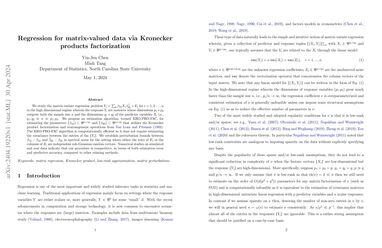Regression for matrix-valued data via Kronecker products factorization
We study the matrix-variate regression problem $Y_i = \sum_{k} \beta_{1k} X_i \beta_{2k}^{\top} + E_i$ for $i=1,2\dots,n$ in the high dimensional regime wherein the response $Y_i$ are matrices whose dimensions $p_{1}\times p_{2}$ outgrow both the sample size $n$ and the dimensions $q_{1}\times q_{2}$ of the predictor variables $X_i$ i.e., $q_{1},q_{2} \ll n \ll p_{1},p_{2}$. We propose an estimation algorithm, termed KRO-PRO-FAC, for estimating the parameters $\{\beta_{1k}\} \subset \Re^{p_1 \times q_1}$ and $\{\beta_{2k}\} \subset \Re^{p_2 \times q_2}$ that utilizes the Kronecker product factorization and rearrangement operations from Van Loan and Pitsianis (1993). The KRO-PRO-FAC algorithm is computationally efficient as it does not require estimating the covariance between the entries of the $\{Y_i\}$. We establish perturbation bounds between $\hat{\beta}_{1k} -\beta_{1k}$ and $\hat{\beta}_{2k} - \beta_{2k}$ in spectral norm for the setting where either the rows of $E_i$ or the columns of $E_i$ are independent sub-Gaussian random vectors. Numerical studies on simulated and real data indicate that our procedure is competitive, in terms of both estimation error and predictive accuracy, compared to other existing methods.
PDF Abstract
